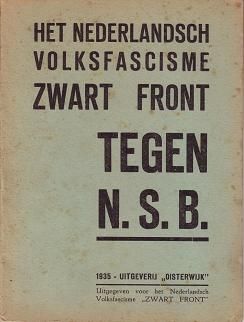Black Front (Netherlands) on:
[Wikipedia]
[Google]
[Amazon]
The Black Front (), later known as the National Front (''Nationaal Front'') was a Dutch

irredentist
Irredentism () is one state's desire to annex the territory of another state. This desire can be motivated by ethnic reasons because the population of the territory is ethnically similar to or the same as the population of the parent state. Hist ...
and fascist
Fascism ( ) is a far-right, authoritarian, and ultranationalist political ideology and movement. It is characterized by a dictatorial leader, centralized autocracy, militarism, forcible suppression of opposition, belief in a natural soci ...
movement active before and during the first years of the Second World War
World War II or the Second World War (1 September 1939 – 2 September 1945) was a World war, global conflict between two coalitions: the Allies of World War II, Allies and the Axis powers. World War II by country, Nearly all of the wo ...
.
Party history
The Black Front grew out of the southern section of the General Dutch Fascist League, with regional organiser Arnold Meijer quarrelling with leaderJan Baars
Joannes Antonius Baars (30 June 1903 – 22 April 1989) was a leading Dutch fascist during the 1930s.
During the 1920s Baars emerged as part of the group associated with ''De Bezem'', a fascist journal aimed at the poor. Philip Rees, '' Biograph ...
and leading his followers out in 1934. Philip Rees, '' Biographical Dictionary of the Extreme Right Since 1890'', p. 260 The Black Front emerged and soon took over a number of smaller movements, while also gaining some support among the poorer parts of society. Although similar to its parent movement, the Black Front emphasised a more Catholic
The Catholic Church (), also known as the Roman Catholic Church, is the List of Christian denominations by number of members, largest Christian church, with 1.27 to 1.41 billion baptized Catholics Catholic Church by country, worldwid ...
line in tune with Meijer's own religious beliefs. Taking its cue in part from Italian fascism
Italian fascism (), also called classical fascism and Fascism, is the original fascist ideology, which Giovanni Gentile and Benito Mussolini developed in Italy. The ideology of Italian fascism is associated with a series of political parties le ...
, it adopted that movement's black-shirted uniform while adding a unique emblem featuring a sword between a pair of ram horns.
As a revolutionary fascist party, the small organisation was fiercely anti-capitalist and often came into contact with the justice system. Meijer was convicted multiple times of ignoring the ban on political uniforms and insulting government officials, including Prime Minister Colijn. In 1938, the Black Front leader spent three months in the prison of Breda for insulting Prime Minister Colijn and Minister Van Schaik. The party also had a paramilitary wing named the Black Storm (''Zwarte Storm'').
The group struggled to gain support from the National Socialist Movement in the Netherlands (NSB); it was renamed the National Front in 1940. The National Front was ultimately banned by Nazi Germany
Nazi Germany, officially known as the German Reich and later the Greater German Reich, was the German Reich, German state between 1933 and 1945, when Adolf Hitler and the Nazi Party controlled the country, transforming it into a Totalit ...
on 14 December 1941, along with all other Dutch political parties except for the NSB. The majority of its members switched to the NSB, although Meijer, disillusioned, left politics altogether.Littlejohn, ''Patriotic Traitors''. p. 100
Members
* Arnold Meijer, party leader; * Eugène van Wessem, Greater Netherlands ideologue and victim of Nazi persecution; * Gustav Adolf Larsen, fascist ideologue; * Jan Derk Domela Nieuwenhuis Nyegaard, Reformed minister and former member of the Council of Flanders.See also
* Black Front *Netherlands in World War II
Despite Dutch neutrality, Nazi Germany German invasion of the Netherlands, invaded the Netherlands on 10 May 1940 as part of ''Fall Gelb'' (Case Yellow). On 15 May 1940, one day after the Rotterdam Blitz, bombing of Rotterdam, the Dutch forces ...
References
{{Fascism Banned far-right parties Fascist parties in the Netherlands 1934 establishments in the Netherlands 1941 disestablishments in the Netherlands Political parties established in 1934 Political parties disestablished in 1941